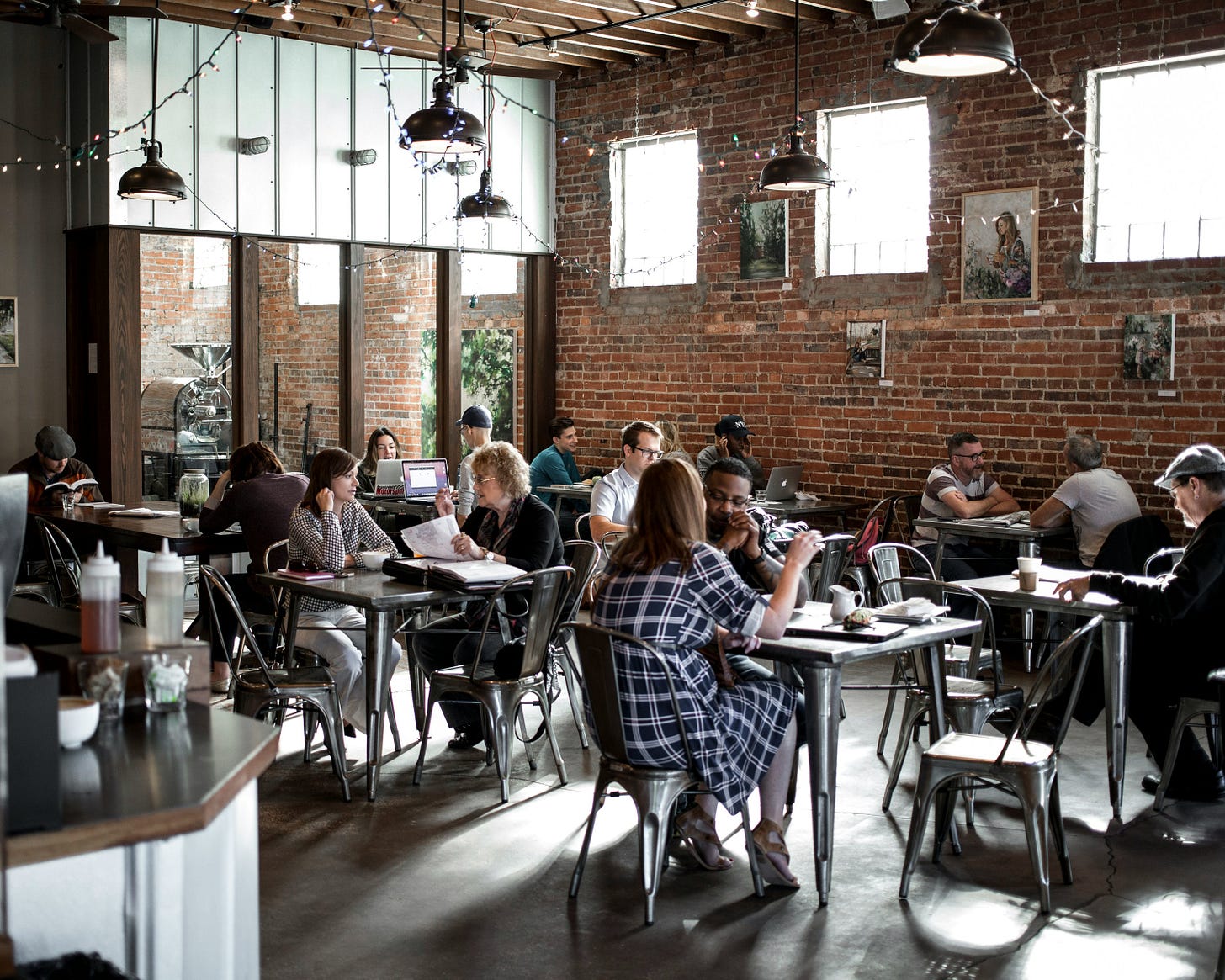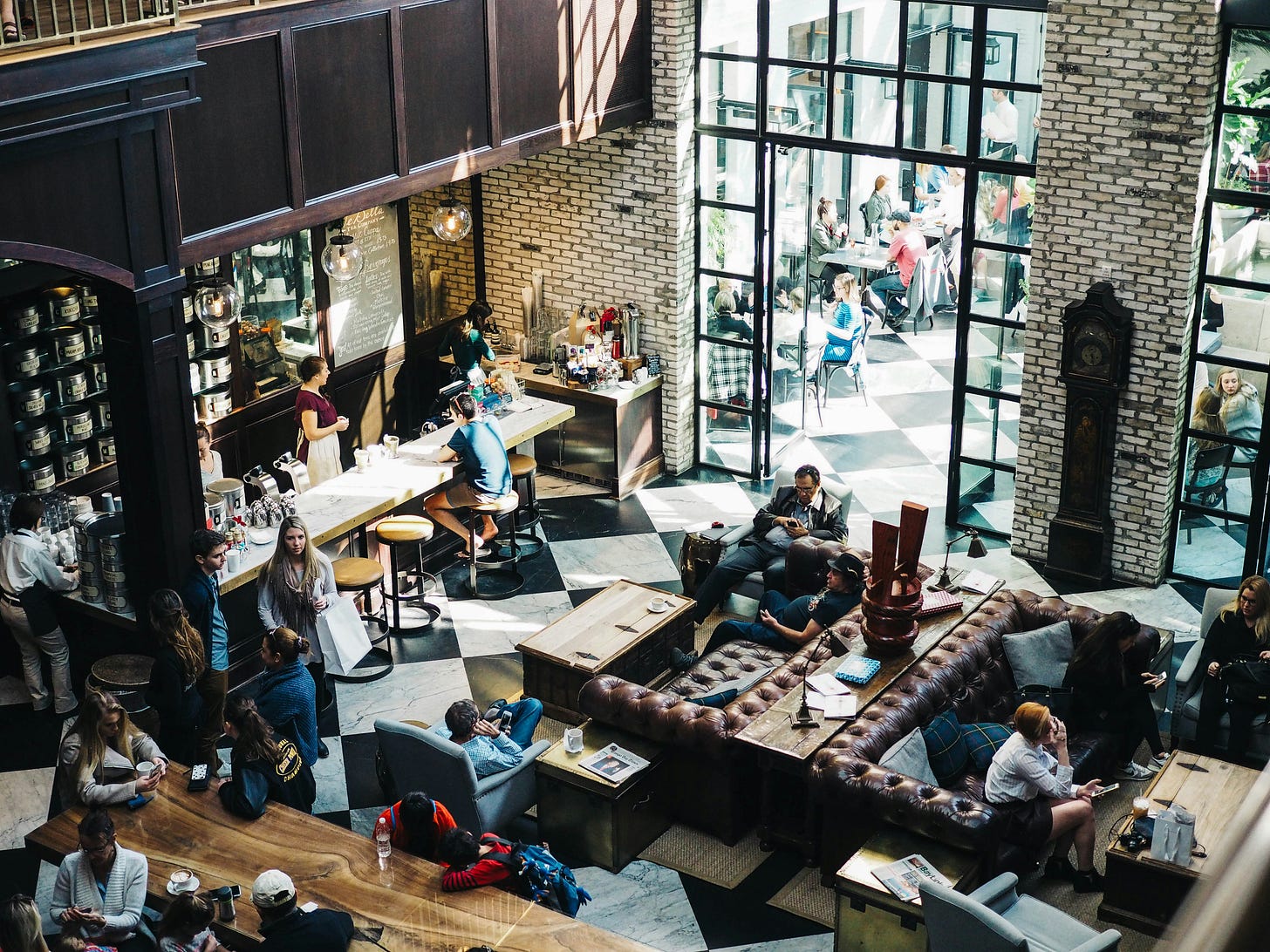The Learning Café
A strange way to imagine the future of schools
I have a dream for my future. It goes like this. I’m the owner and barista of a small, quirky café. There are weird books all over the place. Lots of board games. Mis-matched tables and chairs. And damn good coffee. But what’s weirdest about this café is that people of all ages use it. I mean 7 year olds are making drawings in one corner, 12 years olds are laughing with friends at one table, two 17 year olds are dreaming up a business over there, and plenty of adults are using it just like any café might be used today.
In this café, my real job is a facilitator, but I do this by being a barista. Kids come up to order something, and we chat a bit. They can ask for advice if they want, or some drawing paper, or a tip on who can teach them to skateboard or to write code. They can just be heard. They can share a funny story or a dream they had. My job is to be present for them — and to set good conditions in the space.
What do those good conditions mean? Well, like Priya Parker says so wisely in The Art of Gathering, you start with a debatable purpose. Here that means that this cafe is a place for all ages to learn and connect. It’s not a quiet place. It’s stocked with some of the basic materials — tasty drinks, books and games, comfy chairs. But more importantly, it’s stocked with curious and playful humans. From my perch behind the espresso machine, I make sure that it offers social and psychological safety — no one gets made fun of here, especially not for their quirky passion project or hobby. Everyone is here of their own volition, and everyone is welcome.
That role of barista-facilitator is my personal dream — but the café is my dream for education. It represents a healthy learning space. You go because you want to go — no one is ever forced. Once there, you feel safe and at ease. There are many ways to engage. Maybe you want to sit quietly or read a book. Maybe you’re there to see friends. In my ideal café, there is enough spirit of connectedness that someone could strike up a conversation or visit a table to which they haven’t been explicitly invited, if they’re drawn to it.
Have you ever walked into a café that had particularly good vibes? While physical characteristics help (broad windows, good smells, comfortable seating, available bathrooms), what I measure most is the tone of the conversations. Too quiet and I feel a bit anxious. Too loud, or dominated by one group or person, and I’m planning my exit already. But when there’s a burble of conversation — that table laughing over there, a dialogue over here — then I smile and relax. My ideal background noise. It soothes my soul, invites me to ponder, feel, and be as focused or creative as I’d like.
I think that burble of conversation is a marker of health. One of the teachers I’ve learned the most from, a co-founder with me of Millennium School, had a knack for creating this burble of conversation in his classroom. More than once I would stroll into his class right as he was walking out the door, off to get a supply or go check in with someone, and enter to find 15 or 20 students arrayed around tables, chatting, laughing, working on some project together. It had that perfect burble. Playful, not precious. Focused but not heavy.
Can we build such a place? Well, I wouldn’t mind giving it a try one day. Certainly if I’m ever crazy enough to start a learning place again, or to extend the homeschool experiment I’m currently in the midst of with my 7 year old, I hope it would be closer to this café ideal.
I know it will be a place where an obvious quality of a café — consent to be there — becomes a foundation for the learning experience. No teacher can be forced to teach someone. No student (whether 7 or 70) can be forced to learn something. You simply have access to a place that is fertile for learning. Maybe the café has memberships to art and science museums; maybe it maintains a list of skills that can be shared or exchanged in the community. Maybe it has facilitators leading advisory-style groups, giving each student who wants it a place to reflect, consider goals, note their progress, and generally make sense of their journey.
To me, this is the future of school.
A Learning Café doesn’t provide everything you need to learn. Nothing can promise that, despite schools that feel obliged to make that claim! Rather, a Learning Café aims to be a good-enough starting point. Maybe off to the side of the main café room, there are meeting spaces where a small class, seminar, or project team could meet. But of course the culture of the place — the “social field” — is the reason you show up, even if the coffee (or hot chocolate) really is good (trust me, it will be). Interesting people are always coming and going. You don’t have to check in at the main office. You go off into the town or city when you have a reason to, and you come back when you’re ready to come back. Maybe the teenagers spend a lot of time in apprenticeships or working with mentors — they might stop at the café before and after, or for a bite to eat for lunch.
What if this were school? A place for free learners, of any age.
It’s possible. It’s crazy. It’s the only kind of physically-placed school I can imagine starting again. And I think it could dovetail with a new form of assessment and credentialing, one that can give free learners the chance to live this way without sacrificing future opportunities. More on that in an upcoming post.
Want to join me? Sidle on up to the counter and I’ll be ready to chat. And if you know a good spot in the Bay Area to give this a whirl, I’ll be curious to hear it. In the meantime, maybe the village family network is the starting point. I certainly don’t have all the answers. But I can make a decent cappuccino. Come on up and order your favorite warm beverage, and let’s talk.
In Other News…
My second book baby is now 3 weeks old! I’d love your help to spread the word about it as we get into the new school year. It’s called Challenge Accepted: 50 Adventures to Make Middle School Awesome. My own middle schooler is currently preparing to do on challenge #26 — Making a Time Capsule — and cackling as she imagines how all the memes and shows and other favorites that seem so important to her now will seem comical when she opens this up years from now. That’s one of 50 adventures, each a way to help middle schoolers feel bold, creative, and capable, which is just simply how they naturally are!




You're describing where I work! We have a cafe, study rooms, games, comfy chairs, a Teen space, lots of tables and nooks and crannies...lots of fun programs - come visit the Burlingame Library sometime :)
Check out Alcove Learning in Los Angeles. It’s the cafe model, but in a sweet old Victorian house with the teens in the kitchen making the coffee ☕️ www.alcovelearning.org